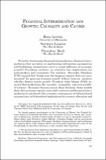| dc.contributor.author | Levine, Ross | |
| dc.contributor.author | Loayza O., Norman | |
| dc.contributor.author | Beck, Thorsten | |
| dc.date.accessioned | 2019-11-01T00:01:36Z | |
| dc.date.available | 2019-11-01T00:01:36Z | |
| dc.date.issued | 2002 | |
| dc.identifier.isbn | 956-7421-072 | |
| dc.identifier.uri | https://hdl.handle.net/20.500.12580/3637 | |
| dc.description | Do better functioning financial intermediaries -financial intermediaries that are better at ameliorating information asymmetrics and facilitating transactions- exert a causal influence on economic growth? Providing evidence on causality has implications for policymakers and economists. For instance, Alexander Hamilton (1781) argued tha 'banks were the happiest engines that ever were invented' for spurring economic growth. Others, however, question whether finance boots growth. President John Adams (1819) asserted that banks harm the 'morality, tranquility, and even wealth' of nations. Economic theories mirror these divisions. Some models show that economic agents create debt contracts and financial intermediaries to ameliorate the economoc consequences of informational asymmetries, with beneficial implications for resource allocation and economic activity. | |
| dc.format | .pdf | |
| dc.format.extent | Sección o Parte de un Documento | |
| dc.format.medium | p. 31-83 | |
| dc.language.iso | eng | |
| dc.publisher | Banco Central de Chile | |
| dc.relation.ispartof | Serieson Central Banking, Analysis, and Economic Policies, no. 3 | |
| dc.rights | Attribution-NonCommercial-NoDerivs 3.0 Chile | * |
| dc.rights.uri | http://creativecommons.org/licenses/by-nc-nd/3.0/cl/ | * |
| dc.subject | DESARROLLO ECONÓMICO | es_ES |
| dc.subject | BANCOS | es_ES |
| dc.title | Financial intermediation and growth: causality and causes | |
| dc.type.doc | Artículo | |
| dc.file.name | BCCh-sbc-v03-p031-084 | |


